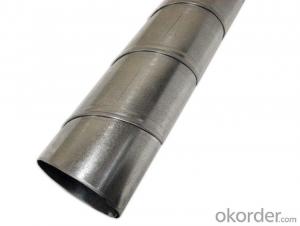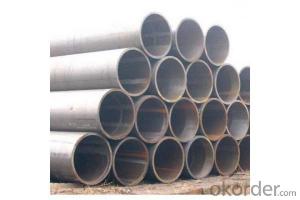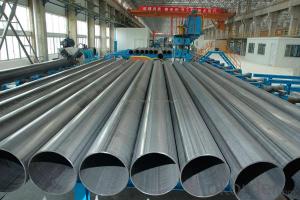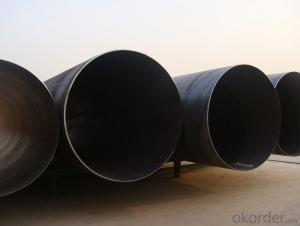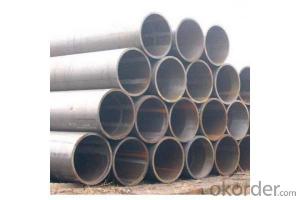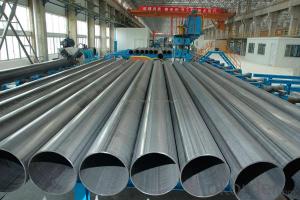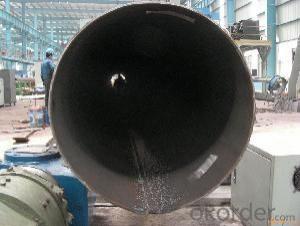LSAW SSAW CARBON STEEL PIPE ASTM API 42'' 46'' 48''
- Loading Port:
- Tianjin
- Payment Terms:
- TT OR LC
- Min Order Qty:
- 1 m.t.
- Supply Capability:
- 3000 m.t./month
OKorder Service Pledge
OKorder Financial Service
You Might Also Like
Packaging & Delivery
Packaging Detail: | Normal exporting packing,in container or bulk vessel or as per clients' request |
Delivery Detail: | 2 months after confimed contract |
Specifications
Large Diameter API 5L X70 PSL2 LSAW Steel Pipe
Grade: X42, X46, X50, X52, X60, B, C
OD: 1.5"-28"
WT: SCH10-SCH160
Large Diameter API 5L X70 PSL2 LSAW Steel Pipe
Specifications:
u Standard: API 5L
u Grade: B, C, X42, X46, X50, X52, X56, X60, X65, X70, X80
u OD: 1.5"-28"
u WT: SCH10-SCH160
u Length: 5-12m
u Ends Finish: plain end, bevel end, grooved end
u Surface Treatment: bare, black varnished, oiled finish, red color, anti-corrosion, 3PE, FBE or epoxy coating
u Technique: hot rolled or cold drawn
u Application: api 5l steel pipe for conveying oil, water, gas
u Invoicing: based on theoretical weight or actual weight
u Payment Terms: L/C at sight, T/T or Western Union
u Trade Terms: FOB, CFR, CIF
u Certification: ABS manufacturing assessment, ABS design assessment, API 5CT, API 5L, DNV manufacturer certificate, ISO9001 quality management system certificate, ISO14001 environment management system certificate, GB/T28001 occupational health and safety management system certificate, A1 class manufacturing license of special equipment certificate, CCS, GL, LR, SGS, TüV, PDE
- Q: What is the purpose of a steel pipe coating?
- The purpose of a steel pipe coating is to provide a protective layer that prevents corrosion and extends the lifespan of the pipe. It also enhances the pipe's resistance to various environmental factors and improves its overall performance.
- Q: Does the seamless steel pipe need rust removal?
- The use of solvent, emulsion cleaning steel surface, in order to achieve the removal of oil, grease, dust, lubricants and other similar organic compounds, but it can not remove rust, scale, welding of steel surface, so the production in anti-corrosion only as an auxiliary means.
- Q: Can steel pipes be used for underground stormwater systems?
- Indeed, underground stormwater systems can utilize steel pipes. Renowned for their resilience and robustness, steel pipes are apt for enduring the pressure and burden of such systems. Furthermore, steel pipes possess remarkable resistance against corrosion, a crucial attribute when handling stormwater potentially laden with diverse pollutants. Nevertheless, it is imperative to adequately coat and safeguard the steel pipes to avert any potential corrosion or harm over time. Routine maintenance and inspections should also be undertaken to guarantee the integrity of the steel pipes and the overall efficacy of the underground stormwater system.
- Q: How are steel pipes used in the manufacturing of scaffolding?
- Steel pipes are commonly used in the manufacturing of scaffolding as they provide structural support and stability. These pipes are used to create the framework of the scaffolding structure, allowing workers to safely access and work at heights. The steel pipes are connected and secured together using couplers, providing a strong and reliable base for the scaffolding system.
- Q: How do steel pipes perform in high-altitude applications?
- Steel pipes perform well in high-altitude applications due to their inherent strength and durability. The high tensile strength of steel allows it to withstand the harsh conditions and extreme temperature variations experienced at high altitudes. Furthermore, steel pipes are resistant to corrosion, making them suitable for use in high-altitude environments where exposure to moisture and atmospheric gases is common. Overall, steel pipes are a reliable choice for various high-altitude applications, including oil and gas transportation, construction, and infrastructure development.
- Q: What is the maximum length of steel pipes available?
- The maximum length of steel pipes available can vary depending on the manufacturer and specific application. However, steel pipes can typically be found in lengths ranging from 20 feet (6 meters) to 40 feet (12 meters) or even longer in some cases.
- Q: What's the difference between a cracked carbon steel tube and a liquid carbon steel tube?
- Test: cracking carbon steel pipe in addition to eddy current testing, but also to do ultrasonic testing, and liquid carbon steel tubes are generally only eddy current testing.
- Q: Can steel pipes withstand high temperatures?
- Yes, steel pipes can withstand high temperatures. Steel is known for its excellent thermal conductivity and high melting point, making it suitable for various applications that involve exposure to elevated temperatures.
- Q: Which is better, galvanized steel pipe or stainless steel?
- In rural and urban areas, it is often necessary to wash them in order to keep them in the open. In the heavily polluted industrial and coastal areas, the surface can be very dirty and even rust. But to obtain the aesthetic effect of outdoor environment, it is necessary to use nickel stainless steel. Therefore, 304 stainless steel is widely used in curtain walls, side walls, roofs and other building applications, but in corrosive industrial or marine atmospheres, it is better to use 316 stainless steel. There are several design criteria including 304 and 316 stainless steel.
- Q: Can steel pipes be used for drainage systems?
- Yes, steel pipes can be used for drainage systems. Steel pipes are durable, strong, and resistant to corrosion, making them suitable for various applications, including drainage systems. They can effectively transport water and waste materials, ensuring efficient drainage.
Send your message to us
LSAW SSAW CARBON STEEL PIPE ASTM API 42'' 46'' 48''
- Loading Port:
- Tianjin
- Payment Terms:
- TT OR LC
- Min Order Qty:
- 1 m.t.
- Supply Capability:
- 3000 m.t./month
OKorder Service Pledge
OKorder Financial Service
Similar products
Hot products
Hot Searches
Related keywords
